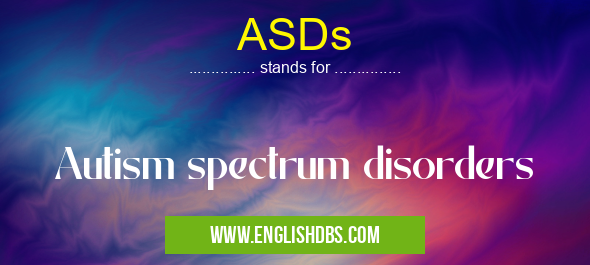What does ASDS mean in CLINICAL MEDICINE
Autism Spectrum Disorder (ASD) is a mental health condition. It affects how people process information and interact with the world around them. It can cause communication difficulties, social challenges, and other behavioral issues. The term ASD encompasses a range of conditions, from mild to severe, and each individual’s symptoms may vary. Treatment for ASDs usually consists of a combination of therapies that are tailored to the individual’s needs.

ASDs meaning in Clinical Medicine in Medical
ASDs mostly used in an acronym Clinical Medicine in Category Medical that means Autism spectrum disorders
Shorthand: ASDs,
Full Form: Autism spectrum disorders
For more information of "Autism spectrum disorders", see the section below.
Defining Autism Spectrum Disorders (ASDs)
ASDs are developmental disabilities that are characterized by difficulty in communication, social interaction, and behavior. They can affect individuals differently; however, ASD typically results in impaired language skills and difficulty understanding the perspectives of others. Individuals with ASD may have difficulty controlling their emotions or staying focused, while some experience savant-like abilities in particular areas such as math or music. Additionally, many individuals with ASDs show an increased sensitivity to sensory stimulation such as sound or touch. Symptoms vary widely by individual but generally fall into three categories: social deficits, communication deficits, and repetitive behaviors or restricted interests.
Diagnosis of ASDs
A diagnosis of ASD is made based on the observed signs and symptoms reported by family members and carers along with a clinical assessment by a clinician. Typically diagnostic criteria includes assessing impairments associated with communication skills (including verbal and nonverbal), social interactions (including relationships with peers) as well as behaviours (such as restricted interests). A medical history review may also be taken which assesses possible causes for the disorder such as neurodevelopmental disorders or medical conditions that may be underlying factors for ASD diagnosis.
Treatment
Treatment for autism spectrum disorders typically involves therapies that are designed to address specific needs of the person diagnosed with ASD such as speech/language therapy to increase communication skills or occupational therapy to improve sensory integration problems. Other treatments commonly used include Applied Behavior Analysis (ABA), which teaches strategies to build better academic performance and social skills; Pragmatic Language Therapy which helps improve conversational engagement; Social Thinking Therapy which helps teach appropriate social responses; Floortime Therapy which focuses on facilitating naturalistic interactions; and Relationship Development Intervention which focuses on building relationships between parents/caregivers and affected individuals.
Essential Questions and Answers on Autism spectrum disorders in "MEDICAL»CLINICAL"
What is an autism spectrum disorder?
Autism spectrum disorder (ASD) is a range of complex neurodevelopment disorders, characterized by social impairments, communication difficulties, and restricted, repetitive and stereotyped patterns of behavior.
How is ASD diagnosed?
ASD is typically diagnosed in early childhood after careful observation of developmental markers and analysis of a child’s behavior. Diagnosis often involves assessment by a trained clinician or medical doctor.
Are there different types of autism spectrum disorders?
Yes, the Autism Diagnostic Observation Schedule–Generic (ADOS-G) categorizes autism spectrum disorders into 4 main categories including Autistic Disorder; Asperger Syndrome; Childhood Disintegrative Disorder; and Pervasive Developmental Disorder Not Otherwise Specified (PDD-NOS).
What are some common signs that may indicate ASD in children?
Some common signs that may indicate the presence of an ASD includes delayed speech development or language acquisition; difficulty with basic social skills such as maintaining eye contact and initiating conversation; difficulty understanding nonverbal cues like facial expressions or body language; repetitive behaviors; fragile emotional regulation; hypersensitivity to sensory input; difficulty transitioning between activities.
Are treatment options available for those with ASD?
Yes, there are various treatments available for those with ASD depending on the individual’s needs. Such treatment often include applied behavior analysis (ABA), speech therapy, occupational therapy, nutritional therapy and medication management.
Is there a cure for autism spectrum disorders?
Currently, there isn’t a ‘cure’ for ASD but many individuals can improve significantly with certain treatments through early intervention and continued support throughout their lifetime.
Are there any risk factors associated with having an autism spectrum disorder?
There are several potential genetic and environmental risk factors associated with developing an autism spectrum disorder such as having family history of ASD, maternal illness during pregnancy or the use of certain medications during pregnancy. Additionally, low birth weight or premature birth has been linked to higher risk of developing an autism disorder in young children.
How can I support someone on the autism spectrum?
Depending on the individual’s needs and preferences, support strategies could include providing structure in daily life routines; creating visual supports describing tasks/daily activities; using clear instructions for everyday tasks that break them down into smaller steps; providing consistent supported practice to teach new skills; identifying triggers that lead to difficult behaviors then implementing strategies before they occur. Most importantly provide positive reinforcement when appropriate.
Final Words:
Autism spectrum disorder is a complex condition that can present itself in varied ways from person to person based on individual needs. While there is currently no known cure for autism spectrum disorder, early intervention plays an important role in helping those affected lead successful lives through therapies tailored specifically for them. Through continued research efforts we hope to come closer to finding more effective methods for treatment of this difficult condition.
ASDs also stands for: |
|
| All stands for ASDS |
